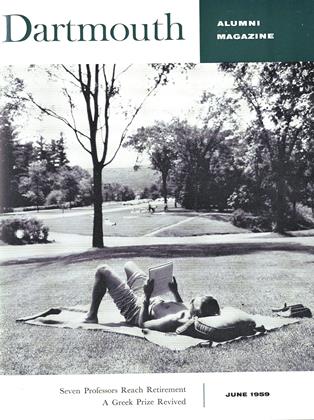By Richard Mansfield Haywood '26. New York:Crowell, 1958. 178 pp. $3.50.
Since Gibbon's day the problem of the decline and fall of the Roman Empire in the West has had an almost irresistible facination for historians and laymen alike. As a result, there have been about as many different explanations of the sudden collapse of Roman power as there have been scholars who considered the problem. Professor Haywood's purpose in writing this short book is to cut through the mass of theorizing and "to tell in a straightforward and nontechnical way what contemporary working scholars think happened to the Romans."
Professor Haywood wastes little space on scholarly theories. Most of the book is devoted to a clear, if at times oversimplified, account of political, social, and economic developments in the Roman Empire from the second to the fifth centuries. These developments are examined by following the government's handling of what Professor Haywood regards as its five most persistent problems: maintenance of its authority, regulation of the succession to the throne, finance, foreign affairs, and the army. Attention is also given to cultural and artistic changes as well as the impact of Christianity on the individual and the state.
The title of the book must be taken literally. Professor Haywood places himself squarely in the ranks of those who believe that there was no decline either in the general cultural level or in the effectiveness of the government and the vigor of the Romans. Most readers will agree with him that there probably was no single factor which necessitated the fall of the Roman state. Few, however, will follow him when he argues that the western provinces were lost because the government did not recruit citizens into the army. Certainly there was more to Rome's failure than mistakes of judgment, chance, or the lack of ten thousand men along the Rhine. Fortunately, Professor Haywood gives enough of the details about the state of affairs in the fourth and fifth centuries so that the reader will be -able to decide for himself why the Western Empire collapsed.
 View Full Issue
View Full Issue
More From This Issue
-
 Feature
FeatureMy 65 Years as a Class Secretary
June 1959 By CHARLES C. MERRILL '94 -
 Feature
FeatureA Panathenaic Prize Amphora
June 1959 By DIETRICH VON BOTHMER -
 Feature
FeatureLOG DRIVE
June 1959 By DOUGLAS M. PEASE JR. '58 -
 Feature
FeatureRetirement Nears for Seven Dartmouth Professors
June 1959 -
 Article
ArticleThe Fraternity Discrimination Issue
June 1959 -
 Article
ArticleTHE UNDERGRADUATE CHAIR
June 1959 By RONALD F. KEHOE '59
NORMAN A. DOENGES
Books
-
 Books
BooksALUMNI PUBLICATIONS
December 1921 -
 Books
BooksThe November number of the Intercollegiate
JANUARY, 1928 -
 Books
BooksROOSEVELT AND THE RUSSIANS
December 1949 By Charles B. McLane '41 -
 Books
BooksSELECTIONS FROM ANCIENT GREEK HISTORIANS IN ENGLISH,
October 1939 By H. E. Burton -
 Books
BooksVICTORIAN ORIGINS OF THE BRITISH WELFARE STATE
May 1961 By JOHN G. GAZLEY -
 Books
BooksALL THE BEST IN THE SOUTH PACIFIC.
June 1961 By JOHN HURD '21




